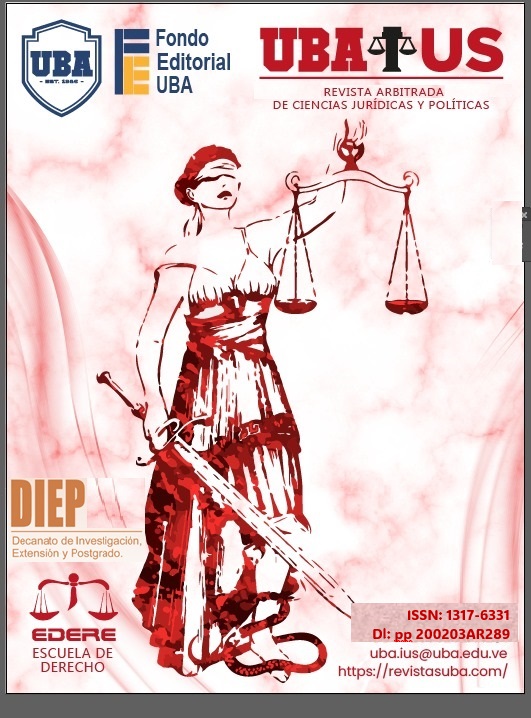INCIDENCIAS EN LOS DERECHOS DEL INVESTIGADO DURANTE LA FASE PREPARATORIA: IMPACTS ON THE RIGHTS OF THE PERSON UNDER INVESTIGATION DURING THE PREPARATORY PHASE
Publicado 2025-04-17
Palabras clave
- Constitutional Rights, Preparatory Phase, Criminal Procedural Law.,
- Derechos Constitucionales, Fase Preparatoria, Derecho procesal penal.
Cómo citar
Resumen
El Ministerio Público, es una institución garante de la legalidad, accesible e imparcial y cuyo marco de actuación deriva en el ejercicio de la acción penal en representación del Estado Venezolano; No obstante, su ámbito de actuación va más allá de perseguir de oficio la comisión de hechos punibles, así como, la determinación de la responsabilidad penal de sus autores o participes; De allí que, su misión se enfoca en actuar en representación del interés general y garantizar el cumplimiento del ordenamiento jurídico, propendiendo así, la preservación del Estado Social, Democrático, de Derecho y de Justicia; En tal sentido, el presente trabajo consistió en establecer e identificar de manera efectiva los derechos que tiene el ciudadano denunciado durante la fase preparatoria del proceso penal, ya que la Constitución de la República Bolivariana de Venezuela estable la asistencia jurídica y el acceso a las pruebas, y mal podría el Ministerio Publico negar el acceso al expediente al denunciado ya que “no se encuentra en calidad de Imputado” violentando así sus derechos constitucionales y el debido proceso; es por ello que esta investigación se centra en esas incidencias que existen en la fase preparatoria del proceso penal ya que el derecho de defensa descansa sobre la posición de igualdad de medios y oportunidades de que gozan acusador y acusado, de las armas procesales y su ocasión de empleo. Sin embargo, hay diferencias entre la naturaleza jurídica de las facultades de ambos, ya que a diario las Dependencias Fiscales del Estado Táchira, en materia de Delitos Comunes, registran un número considerable de Causas Investigativas, producto de inicio de investigaciones en el cual a pesar de ser el ciudadano mencionado como presunto autor del hecho y estando con la debida asistencia Jurídica no le es permitido el expediente ya que no se encuentra en calidad de imputado; Evidenciándose así, una violación a lo Establecido en el Artículo 49 de la carta magna. Palabras Clave: Derechos Constitucionales, Fase Preparatoria, Derecho procesal penal.
Abstract
The Public Prosecutor's Office is an accessible and impartial institution that guarantees legality. Its scope of action involves the exercise of criminal prosecution on behalf of the Venezuelan State. However, its scope of action goes beyond the ex officio prosecution of punishable offenses and the determination of criminal liability of perpetrators or participants. Therefore, its mission focuses on acting on behalf of the general interest and ensuring compliance with the legal system, thus promoting the preservation of the Social, Democratic, Rule of Law, and Justice State. In this regard, this work consisted of effectively establishing and identifying the rights of the accused citizen during the preparatory phase of the criminal process, since the Constitution of the Bolivarian Republic of Venezuela establishes legal assistance and access to evidence, and the Public Ministry could hardly deny access to the file to the accused since "he is not in the capacity of Accused", thus violating his constitutional rights and due process; That is why this research focuses on those incidents that occur in the preparatory phase of the criminal process since the right to defense rests on the position of equality of means and opportunities enjoyed by the accuser and the accused, of the procedural weapons and their opportunity to use them. However, there are differences between the legal nature of the powers of both, as the Táchira State Prosecutor's Offices, in matters of Common Crimes, record a considerable number of investigative cases daily. These are the result of investigations initiated in which, despite the citizen mentioned as the alleged perpetrator of the crime and having the appropriate legal assistance, the case file is not permitted to be opened because he is not a defendant. This demonstrates a violation of the provisions of Article 49 of the Constitution. Keywords: Constitutional Rights, Preparatory Phase, Criminal Procedural Law.
Citas
- Asamblea Nacional. (2021). Código Orgánico Procesal Penal. Gaceta Oficial Extraordinaria N.º 6.644, 17 de septiembre.
- Constitución de la República Bolivariana de Venezuela. (1999). Gaceta Oficial N.º 5.453, 24 de marzo de 2000.
- Cordero, V., Hernández, J., & Ortiz, L. (s.f.). Introducción a la investigación: Manual del estudiante. Universidad Pedagógica Experimental Libertador, Instituto Profesional del Magisterio.
- Hernández, S., Fernández, C., & Baptista, L. (2010). Metodología de la investigación. McGraw-Hill Interamericana.
- Malavé, L. (2003). Trabajo de investigación. Colegio Universitario José Lorenzo Pérez Rodríguez.
- Martínez, M. (2008). Epistemología y metodología cualitativa en las ciencias sociales (1.ª ed.). Trillas.
- Nolla Cao, N. (2004). Los tipos de investigación. Cuadernos Monográficos Candidus, 1(2), 1-13.
- Palella, S., & Martins, F. (2006). Metodología de la investigación cuantitativa (2.ª ed.). Fondo Editorial de la Universidad Pedagógica Experimental Libertador.
- Pérez, G. (2000). Investigación cualitativa: Retos e interrogantes (3.ª ed.). La Muralla.
- Ramírez, T. (1999). Cómo hacer un proyecto de investigación (1.ª ed.). Panapo de Venezuela.
- Sautu, R., Boniolo, P., Dalle, P., & Elbert, R. (2006). Manual de metodología. Editorial Clacso.
